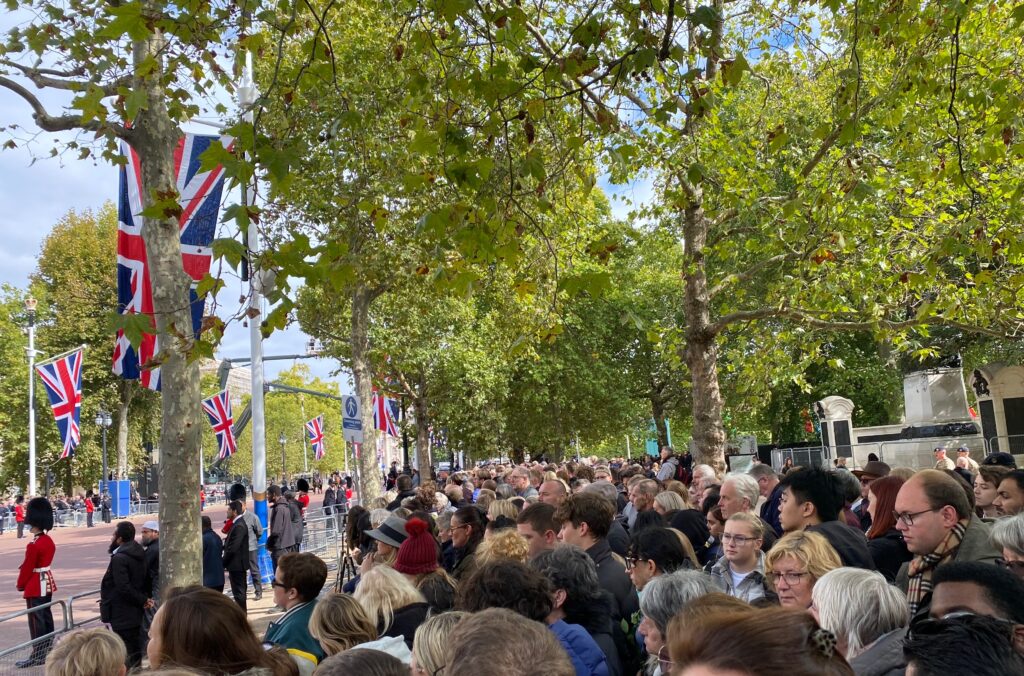I never met Queen Elizabeth II personally, but in common with so many others, felt her to be a constant presence in my life. She was someone who reminded me of my own grandmother, someone to be listened to and respected, and someone I felt great affection towards. I’ve liked and respected the Queen since such an early age that I’ve never really stopped to think about why until the last couple of weeks.
Why did I and so many others have such fondness towards Queen Elizabeth? Why did the people in “The Queue” that I stood in last Saturday speak of her with such warmth?
It wasn’t because she was famous. She transcended mere celebrity. Although she was familiar to us all, at the same time that we knew very little about her personal tastes and opinions. It was not because she was powerful. While hugely influential, the monarch of the UK has a role that is essentially ceremonial. It certainly wasn’t because she was rich – such a quality is more likely to provoke resentment and controversy in these economically challenged times. Yet a quarter of a million people were willing to queue for 12 or more hours, day and night, to spend less than a minute in a demonstration of respect and thanks for this woman.
As we have watched and listened to many from all walks of life speak of Her Late Majesty, the reasons for our collective affection have centred on her character and behaviour, not her position.
Elizabeth the Second was a person who displayed – albeit imperfectly – what the Bible calls the “fruits of the Spirit”: love, joy peace, patience, kindness, goodness, faithfulness, humility and self-control.¹
She loved her people. Not in an emotional, sentimental sense, but with a deliberate and effort-full love. She made that famous vow to be devoted to our service.
She had an immense enjoyment of life. It wasn’t the jewels and palaces that she seemed to take most delight in. It was her family, animals, music and different sports. She appeared genuinely interested in other people and their stories and took pleasure in honouring others. We all know people who can find a downside to the best circumstances in life! The queen was the opposite: she seemed to love to take in joy in things.
She was a reconciler. Although a monarch without any official power as such, the Queen famously used her influence to help many world leaders talk to one another. She watched and listened and used her knowledge to be a peace-maker.
When the “mood” of the country changed, she didn’t – she waited, she watched. She didn’t go for quick fixes. She was patient and prepared to ride the storm.
There have been many stories in the last couple of weeks of her kindness: giving a neighbour some cattle to restart his farm after disease wiped out his stock, sending letters of condolence to the bereaved around the world, supporting and assisting those in the military and other public services. Queen Elizabeth II had good (the best!) manners with everyone, whether she agreed or liked them or not. She was consistently kind.
She was morally faithful to her husband for 73 years. She had a personal integrity, looking for ways for The Crown to do good to others, engaging in charity work that would benefit the weak.
We are in an age of broken promises. No one seems to trust anyone else. But the Queen showed in her life that she valued and upheld the promises she made. She referred to her vow several times, confirmed it more than once and although the 21-year-old who made that promise could have had no inkling of the difficulties and effort that would be involved in keeping the promise, she did.
Although it would have been possible for her to retire from public duties and live in luxury, only a few months ago, in her frailty, Queen Elizabeth actively worked to make the nation smile by appearing on TV, not this time in her royal robes and tiara, but alongside Paddington Bear at a somewhat messy tea party! At that time of her Jubilee, she wrote to the nation, referring to herself as “your servant”. She was humble and grateful for her position and responsibilities.
She withstood family difficulties, grief and recently, pain and increasing frailty, but had a self-control that was legendary.
It is no surprise that she demonstrated these characteristics, the fruits of the spirit, because she was a Christian. These qualities do not earn someone a place in God’s Kingdom. Rather, the Queen chose to follow the teachings of Lord Jesus because she belonged to Him. In one of her Christmas speeches she famously said:
“God sent into the world a unique person – neither a philosopher nor a general, important though they are, but a Saviour, with the power to forgive.
Forgiveness lies at the heart of the Christian faith… It is in forgiveness that we feel the power of God’s love.”²
In the past few weeks, those who knew the Queen have spoken of how she needed no prayer book or guidance to pray; it was clear to them that prayer was a regular and familiar part of her life. She knew passages of scripture by heart and referred to the Psalms when she was going through difficult times. It appeared that these things were not habit and formality, but the outworking of an active, living relationship with God. Others have spoken of how she did not fear death. She had no need to. Jesus Christ was her Saviour.
 A few days ago, I stood in The Mall in London listening, alongside tens of thousands of others, to the funeral service of the Queen, broadcast on loud speakers around central London. It was an exceptional atmosphere. At the first sound of the choir from Westminster Abbey the entire crowd stilled and listened with absolute intensity for the whole hour as the gospel was proclaimed in word and song.
A few days ago, I stood in The Mall in London listening, alongside tens of thousands of others, to the funeral service of the Queen, broadcast on loud speakers around central London. It was an exceptional atmosphere. At the first sound of the choir from Westminster Abbey the entire crowd stilled and listened with absolute intensity for the whole hour as the gospel was proclaimed in word and song.
Having watched the TV coverage since I think the visual splendours of the Abbey, the church officiants, the military and the mourners were possibly a little distracting from the messages in the songs and readings chosen by the Queen. Nevertheless, God’s good news of salvation from sin and hope of eternal life was declared and heard by more than half the worlds’ population.³ After a lifetime of service, maybe this was her greatest kindness to the world.
From the opening sentences:
I AM the resurrection and the life, saith the Lord: he that believeth in me, though he were dead, yet shall he live: and whosoever liveth and believeth in me shall never die. 4
From the first lesson:
O death, where is thy sting? O grave, where is thy victory? The sting of death is sin; and the strength of sin is the law. But thanks be to God, which giveth us the victory through our Lord Jesus Christ.5
From the second lesson:
Jesus saith unto him, I am the way, the truth, and the life: no man cometh unto the Father, but by me. 6
From the sermon:
“The pattern for many leaders is to be exalted in life and forgotten after death. The pattern for all who serve God – famous or obscure, respected or ignored – is that death is the door to glory.
Christian hope means certain expectation of something not yet seen. Christ rose from the dead and offers life to all, abundant life now and life with God in eternity. As the Christmas carol says “where meek souls will receive him, still the dear Christ enters in.”
We will all face the merciful judgement of God: we can all share the Queen’s hope which in life and death inspired her servant leadership.” 7
The anthem:
WHO shall separate us from the love of Christ? Neither death, nor life, nor angels, nor principalities, nor powers, nor things present, nor things to come, nor height, nor depth, nor any other creature, shall be able to separate us from the love of God, which is in Christ Jesus our Lord. Alleluia! Amen. 8
I thank God for giving us a leader and figure head, who loved Him, someone who promoted freedom of belief, someone who worked to help others, and tried to improve life for others. Someone who reigned with love rather than power. Someone whose sins were forgiven, who I will one day meet, not as my Queen, but as my sister in Christ as we both bow before the King of Kings.
May her son succeed her in all these things.
God save the King.
If you would like to know more about the Christian faith please get in touch with us.
If you are local you would be welcome to come to a short course, starting on October 12th called “Hope Explored”.
If you’re not local, still get in touch and we’d be pleased to try to put you in touch with Christians near you.
Hazel Thomas, September 2022
References:
1 Galatians 5:22 (Good News Translation® (Today’s English Version, Second Edition) © 1992 American Bible Society. All rights reserved.
2 Extracts from the Queen’s Christmas Message, 2011 as published by the BBC (https://www.bbc.co.uk/news/uk-16328899).
3 The Queen’s Funeral in Numbers. Article in the Evening Standard, 20th September 2022.
4 John 11:25-26 (KJV).
5 1 Corinthians 15:55-57 (KJV).
6 John 14:6 (KJV).
7 Extracts from the sermon by Justin Welby, Archbishop of Canterbury (https://www.archbishopofcanterbury.org/speaking-writing/sermons/archbishop-canterburys-sermon-state-funeral-her-majesty-queen-elizabeth-ii).
8 Romans 5:35 and 38-39 (KJV).
The full order of service for the State Funeral of Her Majesty Queen Elizabeth II can be found here.
Hope Church is not responsible for the content of external websites. The inclusion of a link to a third party website should not be understood as an endorsement.
